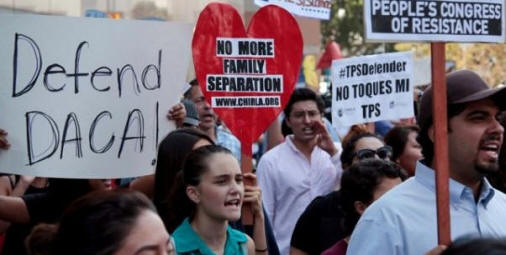
The Great Smoky Mountain Journal
Staff Reports
Posted: Sunday, January 21, 2018 03:50 PM
Trump Administration Announces End To Obama-Era "DACA" Program - Deferred Action For Childhood Arrivals
The Department of Homeland Security formally rescinded the Deferred Action for Childhood Arrivals program, known as DACA, with a six-month delay for current recipients. According to Acting Homeland Security Secretary Elaine Duke, the interval is meant to give Congress “time to deliver on appropriate legislative solutions.”
“However, I want to be clear that no new initial requests or associated applications filed after today will be acted on,” Duke said in a written statement.
Attorney General Jeff Sessions, speaking to reporters, blasted the Obama administration's "disrespect for the legislative process" in enacting the 2012 policy. He said the “unilateral executive amnesty” probably would have been blocked by the courts anyway.
“The executive branch, through DACA, deliberately sought to achieve what the legislative branch specifically refused to authorize on multiple occasions,” Sessions said, blaming the policy for the recent “surge” at the border. “Such an open-ended circumvention of immigration laws was an unconstitutional exercise of authority by the executive branch.”
A day earlier, Sessions sent Duke a letter with his legal determination that the 2012 executive action was unconstitutional.
The Trump administration was facing a Tuesday deadline to make a decision on DACA or face legal action by Republican state AGs who hoped to force the president’s hand in discontinuing the program.
Administration officials cast their approach Tuesday at the least disruptive option.
During the 2016 presidential campaign, Trump had promised to terminate DACA, though he appeared to soften his stance since taking office. In ending the program with a six-month delay, Trump put the onus on Congress to pass a legislative fix.
According to DHS, no current beneficiaries will be impacted before March 5, 2018.
“Congress, get ready to do your job - DACA!” Trump tweeted Tuesday morning.
dacaExpand / Collapse
In this Aug. 15, 2017, file photo, a woman holds up a signs in support of the Obama administration program known as Deferred Action for Childhood Arrivals, or DACA, during an immigration reform rally at the White House in Washington. (AP Photo/Jacquelyn Martin, File)
While some Republicans support the goals of the DACA program, many opposed the use of executive action to institute it, describing the move as a presidential overreach.
Sen. Lindsey Graham, R-S.C., is among those who now supports the call to protect so-called “Dreamers” with legislation.
“I have always believed DACA was a presidential overreach,” he said in a statement. "However, I equally understand the plight of the Dream Act kids who -- for all practical purposes know no country other than America. If President Trump makes this decision we will work to find a legislative solution to their dilemma.”
On a conference call, administration officials said Tuesday they are still prioritizing criminal aliens for deportation. But they described the original DACA criteria as very broad and cited the legal determination of the Justice Department.
During the presidential campaign, Trump referred to DACA as “illegal amnesty.” However, he seemed to edge away from that stance in April when he told the Associated Press that DACA recipients could “rest easy.”
WHAT IS DACA AND WHY WOULD TRUMP DISMANTLE IT?
The DACA program was formed through executive action by former President Barack Obama in 2012, allowing recipients to get a deportation reprieve – and work permits – for a two-year period subject to renewal. Under the program, individuals were able to request DACA status if they were under the age of 31 on June 15, 2012, came to the U.S. before turning 16 and have continuously lived in the country since June 15, 2007. Individuals must also have a high school diploma, GED certification, been honorably discharged from the military or still be in school. Recipients cannot have a criminal record.
Congress had been considering legislation to shield young illegal immigrants from deportation for years, dating back to the George W. Bush administration. Lawmakers tried again to pass a bill during the Obama administration, but couldn’t muster the votes amid flagging Republican support before Obama formed the program in 2012.
Nearly 800,000 undocumented youth are currently under the program's umbrella.
HILL REPUBLICANS REVIVE ‘DREAM ACT’ TALKS AS TRUMP DECIDES FATE OF OBAMA PROGRAM
On Friday, House Speaker Paul Ryan, R-Wis., said he supported a legislative solution to protect undocumented minors, but also urged the president to reconsider scrapping DACA.
"I actually don't think he should do that and I believe that this is something that Congress has to fix," Ryan said on radio station WCLO in Janesville, Wis., Friday. "President Obama did not have a legislative authority to do what he did."
Ryan added: "There are people who are in limbo. These are kids who know no other country, who were brought here by their parents and don't know another home. And so I really do believe that there needs to be a legislative solution."
But opposition to the DACA termination is expected to be fierce.
Daniel Garza, president of the Libre Initiative, told Fox News that DACA offers a "reprieve from a life of uncertainty for innocent kids who didn't break the law."
"It's rather disappointing to think they could return to a state of anxiety and fear," he said, calling on Congress to pass a "permanent resolution for these innocent kids."
Democrats on Thursday expressed opposition to the move, referencing the president’s past comments.
“If he ends DACA, Trump would betray #DREAMers he said he'd treat w/ ‘great heart.’ These incredible young people make our country stronger,” tweeted Virginia Sen. Tim Kaine, the 2016 Democratic vice presidential nominee.
The timing of the decision had changed in recent days. “Sometime today or over the weekend, we’ll have a decision,” Trump told reporters on Friday but just hours later White House press secretary Sarah Sanders said that Trump would announce his decision on Tuesday after the country celebrated Labor Day.

